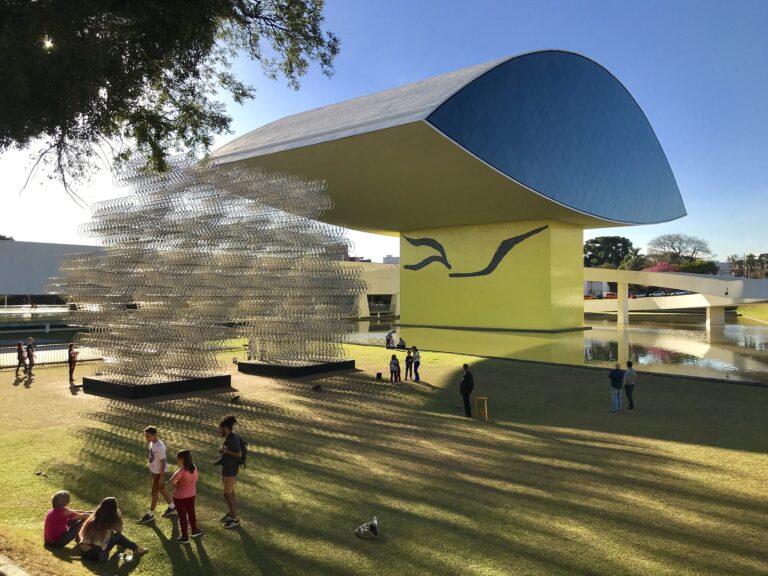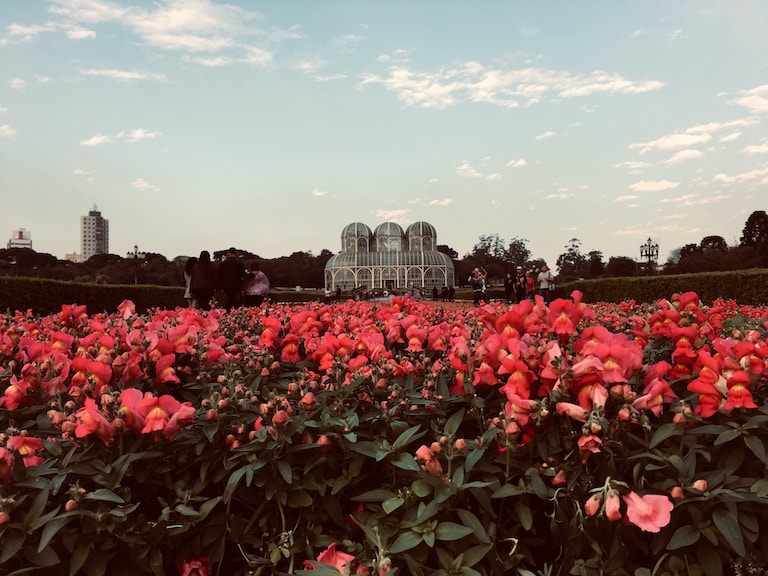Are you intrigued by the idea of dropping everything and moving abroad? Everyone who leaves their home country to begin a life somewhere else in the world has a very unique and personal reason for doing so, whether it’s for their studies, for their job, for language-learning purposes, for a cultural experience, or for the sheer thrill of the adventure. MosaLingua team members live all over the world, and many have chosen to live in a different country from that in which they grew up. Today, we’re interviewing Sarah, our Japanese language expert, about her experience as an expat living in Brazil.

Meet Sarah, An Expat Living in Brazil
Living abroad is a truly enriching experience for so many reasons.
For one, it gives you a taste of a culture that might be the polar opposite of what you know. And this experience of “otherness,” in turn, can help you better understand your own culture and what makes it unique.
It’s also a wonderful opportunity to learn a new language or to improve the skills you’ve already acquired, through cultural and linguistic immersion.
Our team is passionate about languages and experiences abroad, and each and every member has an interesting story to tell! Today, our content editor and Japanese expert Sarah is answering our questions about what life is like as an expat living in Brazil!
Start by introducing yourself. Where are you from? What do you do?
My name is Sarah and I’m Franco-Japanese. I was born in Paris, where I grew up and lived most of my life. I’m a content writer at Mosalingua and a French teacher at an international school in Curitiba. I have been living there since 2018 with my family.
Why did you decide to move abroad? How did you land on Brazil?
I met my Brazilian partner while traveling to Brazil in 2014 for a friend’s wedding. The following year, he came to Paris to start a Ph.D. Four years later, our son was born and we decided to move to Curitiba, his hometown.
It was my second time living abroad—I had lived in Canada 10 years earlier.
Start improving your Portuguese today
Want to improve your Portuguese?
Good news: we can help!
More good news: you can get started for free! With your free trial, you can test drive the most effective method for learning Portuguese for the next 15 days !Vocabulary flashcards, videos with subtitles, audiobooks, articles adapted to your level – with MosaLingua Premium (Web & Mobile), you’ll have access to all this and more. Get started right now. It’s free—and risk-free—to try!
Tell us a little bit about Curitiba.
Curitiba is the capital of the state of Paraná, in the South. It is the 8th most populous city in the country, with about 1.9 million residents. The city is known for its innovative approach to urban planning and sustainable development. It’s a lovely city to live in—it has lots of green space and a pretty big cultural scene with plenty of museums, art galleries, theaters, and festivals.
Curitiba isn’t at all like the clichés you’ve heard and doesn’t look much like the postcards you may have seen of Brazil. It’s over 60 miles from the beach, and it doesn’t host a big flashy carnival, unlike Rio de Janeiro or Salvador. Founded in 1693, it’s a relatively young city without much architecture that dates back to before the colonial period.
How did the moving and immigration process go for you?
The process of moving and getting settled into my host country went smoothly for me. Having help and guidance from a local, my son’s father, made things much easier. The administrative tasks you need to complete when relocating to a new country can be very complex, especially when you don’t know the language or aren’t familiar with the local institutions. Between apartment hunting and enrolling in school, among other things, I had to juggle a lot at once. Honestly, I would have had a completely different experience if I had come alone.
Did you start learning Portuguese before you moved to Brazil?
When I arrived in Brazil, I didn’t speak a word of Portuguese. I had learned some basic phrases like “Bom dia/Boa tarde” (Hello) and “Tudo bem?” (How are you?), but that’s about it.
So, I did what made the most sense to me at the time. I enrolled in a language school near my home that was recommended to me. It allowed me to learn the language but also to meet people who, like me, had recently moved to Curitiba from another country.
It ended up being a smart move, and it paid off. Not only did I learn relatively quickly—I went from the A1 beginner level to an intermediate B1 level in just 4 months)—but I met some great people who I am still friends with to this day.
Besides language classes, what methods did you use to learn Portuguese? Do you have any advice for our readers?
I owe a lot of my progress to the immersive experience I had. It is obviously easier to learn Brazilian Portuguese when you actually live in Brazil.
I was also very lucky to develop a love of Brazilian music early on. I discovered the music and rhythms of Brazil right when I first moved here. Samba, bossa nova, forró, and MPB (musica popular brasileira) were a real gateway into Brazilian culture and language. Music helped me learn pronunciation and the rhythm of the language, and contributed a lot to my desire to learn it. I think it’s a great way to nurture your curiosity about a language. It was really beneficial for me, at least.
It was also around that time that I started looking for language-learning apps and came across MosaLingua. Yep—before joining the team in 2022, I was a regular MosaLingua user! I committed to 10 minutes of practice with my app each day and managed to create a learning routine that has improved my language level immensely.
What is one thing NOT to do when moving abroad?
In my opinion, there is one major pitfall to avoid as an expat. It’s extremely easy to seek out people from a familiar community (French people and French speakers, in my case) and to develop friendships almost exclusively with people who look and speak like you.
When you arrive in a new country, it can be tempting to find people who speak your language. After all, it’s more comfortable to communicate with people who are sure to understand you. But personally, I wanted to avoid getting too involved in the French-speaking community in Curitiba at all costs. I was afraid of getting “stuck” in that bubble and limiting both my social interactions with the locals and my progress in Portuguese.
What has the rest of your experience been like?
After four months of Portuguese school, I was lucky enough to find a job in my field, communication. However, in a completely new sector for me: tourism. I did that for about a year and a half. I was severely underpaid, but I did come away from it with a few precious gifts: exponentially better Portuguese skills and a decent understanding of Brazil (which is not an easy task, considering the country’s size!).
Working in a 100% Portuguese-speaking environment 5 days a week gave me intensive language practice. Concretely, I think I went from an intermediate to an advanced level in mere months, improved my writing skills through email exchanges, and improved my speaking skills through phone conversations with suppliers from all over the country, whose various accents often both amused and confused me!
In terms of cultural differences, what did you find to be most different or challenging?
When I arrived in Curitiba, people would often tell me—and they still do—that Curitibanos are somewhat cold compared to people from other regions, like Rio de Janeiro, Minas Gerais, or São Paulo. Each region is different, and apparently people from Curitiba are more reserved than elsewhere. But, of course, everything is relative. I’m from Paris, and I wouldn’t say that Parisians are cheery, warm, or open-minded. So in contrast, the people of Curitiba seemed rather friendly and willing to chat.
People often say that Curitiba is the most European city in Brazil. The city was founded and populated by successive waves of Italian, Polish, Ukrainian, German, Italian, and Japanese immigrants. We are therefore quite different from the mixed-race Brazilians you’ll meet in Rio and Nordeste.
To come back to the question of culture shock, I’d say that I didn’t experience a huge change in my actual daily life. However, the lifestyle here is very different from that of European cities. That’s the case for most cities in America, actually.
For instance, cities are designed for cars, not pedestrians, which makes the cityscape and way of life there very different. For example, I can no longer stroll through the streets like I used to in Paris. You need a car to go anywhere, because of the long distances and the urban sprawl. You have to plan your trips in advance.
What do you like most about life as an expat living in Brazil?
Brazil has rich and breathtaking natural beauty. With a coastline of about 4,500 miles, the country offers a plethora of beaches, some of which are famous for their natural, rugged beauty, and others that are more urban, where you can relax and enjoy many typical Brazilian activities.
Every time I go to the beach in Brazil, I am surprised at how diverse the crowd is. Kids, young people, older people, couples, families, colleagues, friends… In many cities, the beach is part of the Brazilian lifestyle, and it breaks down class barriers that are otherwise present.
The diversity of biomes in Brazil is impressive. They range from the rainforests of the Amazon basin to the flooded grasslands of Pantanal, to the arid savannahs of Sertão and the Mata Atlantica forest.
I particularly love the Brazilian fauna and flora. I like to photograph birds when I have the opportunity to go hiking in the forest. You don’t have to go far to see toucans, hummingbirds, and all kinds of parrots. It’s a moving sight for me every single time. And I know that my choice to become an expat living in Brazil is what allows me to experience things like that.
Conclusions: Thinking About Moving to Brazil?
We hope that this interview with Sarah has given you some ideas about your own experience abroad. Feel free to share your own experiences, concerns, and questions with us. We’ll answer them to the best of our ability. In the meantime, check out some other articles about this topic:
- Looking to Travel the World? Teach English Abroad!
- 5 Things I Wish I Had Known Before Going to Live Abroad
- Your Ultimate Packing List For Moving Abroad







Comments